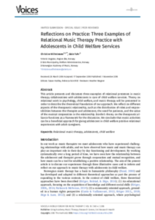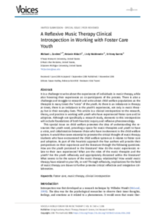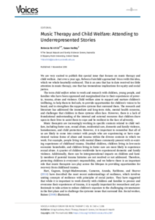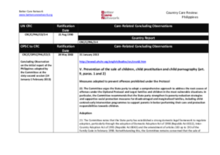Displaying 201 - 210 of 525
This article presents and discusses three examples of relational processes in music therapy collaborations with adolescents in care of child welfare services.
This article is a clinical introspection to the research, theory, and practice in working with youth who have experienced foster care and/or adoption. It is part of the Voices Special Issue on Music Therapy Child Welfare.
The aim of this study was to investigate the degree to which data collection achieves screening aims (identifying scale of problem, impacting on mental health) and the potential analytic value of the dataset.
This editorial introduces the Voices Special Issue on Music Therapy and Child Welfare.
This country care review includes the care related Concluding Observations adopted by the Committee on the Rights of the Child and the Committee on the Rights of Persons with Disabilities.
The present study sought to clarify the relation between maltreatment and mental health among youth in foster care by studying both the isolated dimensions of maltreatment and cumulative maltreatment, and to determine whether the effects of maltreatment on mental health operated indirectly through placement instability.
This study tested the effectiveness of Parent Management Training, Oregon (PMTO) model on child social–emotional well-being.
This comprehensive meta-analysis examined the pooled prevalence of depressive symptoms in ‘left-behind children (LBC)’ in China and its associated factors.
This study tests the associations of risk and protective factors on mental health outcome variables of youth in foster care with disabilities.
This study sought to investigate the emotional facet of self–esteem (SE) in 46 adult survivors of institutional childhood maltreatment (IM) in foster care settings provided by the City of Vienna.




